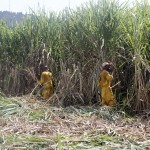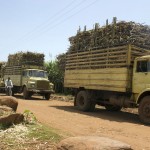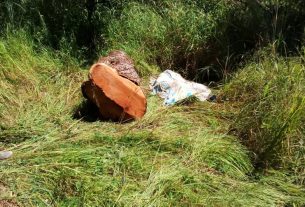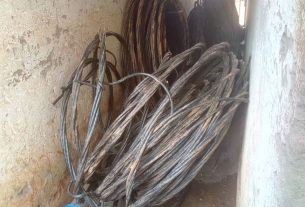Amid fears that ‘excessive’ sugar cane planting which is already a threat to food security is gradually turning into a real security issue in Busoga sub –region, the Police, district and local council leaders have stepped up preventive community policing activities in the area.
The district council of Jinja is in the process of enacting an ordinance to control the spread of commercial sugar cane planting that is threatening to engulf the whole of Busoga in the foreseeable future. The new ordinance, expected to come into force before the end of this year, includes an outright ban on planting cane on family land holdings that only measure two or less acres.
For their part, Police have intensified contact with the farmers, landowners, and LCs. Acting as DPC during October, SSP George Kalamu explained that part of the problem was rooted in the culture of mob justice so prevalent in the region. Put together with the changing economic set up can give an explosive mix.
Mr Kalamu said that peasants have over the past few years been hiring out their land at an average sh500,000 per acre to commercial cane growers to produce for an agreed three cuttings.
“This money is immediately used up on expenses like school fees, domestic consumption or even pleasure,” said the police officer. “Then it dawns on the land owners that the agreed three cuttings will last at least four years or more, all of which time they cannot have access to their land.”
The first cutting comes after some two years and the subsequent cuttings take a year or slightly longer, depending on the soil fertility and rain.
When this realization sinks in, peasants who own the land consider taking several options, most of them illegal. The most indirect one is to go through their children or wives to lodge a complaint against the head of the household jointly with the commercial farmer, telling the authorities that they are being deprived of their very source of livelihood without their consent. But the commercial farmers tend to stand their ground, armed with the signed agreement that gave them access to the land for three cuttings.
In other cases, even when the landowners respects the agreement, many of them being old happen to die before all the agreed cuttings have taken place. Mr Kalamu says that the children tend to contest or disregard the agreement and try to keep the commercial growers of the farms accusing them of stealing their land. This happening before they have done all their harvests, the growers get aggrieved and conflicts arise.
Another other illegal option, which tends to lead to violence, is the landowner to start harvesting the cane illegally. They can do this when the cane attains maturity but before the cane farmer is cleared to supply at the factory. In a rather complicated process meant to ensure orderliness at the factories, registered out-growers are given supply permits which indicate the amounts they can supply to the factory at given times in their supply contract. But it transpires that some factory insiders have been commodifying the permits and help speculators to acquire them. While other dealers buy permits from the speculators to supply, permit holding commercial growers are waiting for their turn as their mature cane waits in the garden. This is when the landowners who are always on the ground steal the cane and sell it (cheaply) to non-growers who have permits. The real owners who planted the cane know that the thieves could not be outsiders and are most likely the landowners who sold them the rights to plant and harvest. That is when serious conflicts arise.
“In some cases frustrated planters just set the cane in which they invested so heavily on fire,” says Christine Nagawoya, the OC CID for Kakira. She has sometimes encountered more murky dealings where an impatient landowner hires out the same plot to two ‘investors’. The first investor plants the cane and may manage to make the first harvest without trouble. But before the second or third cutting, the landowner can offer the cane to another buyer, saying it is his but he needs to liquidate due to some reasons. It such cases of betrayal that sometimes drive the genuine owners of the cane to set commit arson. This leaves the second buyer demanding a refund from the seller, who is unable and unwilling to pay, further exacerbating the conflict situations.
ASP Muhindo who is Officer in Charge of Kakira Police Station has been deploying all his staff to carry out community policing sensitization, starting with the most affected sub country of Busedde.
The Mwangaza team that toured Busedde recently talked to dozens of cane growers, all of whom expressed concern at the tendency of the land owners to change goalposts before the expiry of the agreed duration of the agreements. They also blamed the LCs who usually witness the agreements for not supporting them when the landowners turn against them.
According to SSP Kalamu, Police is incessantly reminding the LCs to scrutinize the land renting deals before endorsing them. According to the guidelines being given to LCs, police advises them to first ensure the person hiring out the land to cane growers has other land on which to grow food before allowing the deal to proceed. In the absence of more land for food growing, the person should at least have another verifiable source of income which can feed his family. Police is also insisting that the LCs should involve the spouses in the land deals in order to secure consent of the family and prevent future claims of being deprived of the land.
“Many men in Busoga seem not to be aware of the rights of women and girls when they are transacting on family land,” observes the officer. “They only find out when the disputes are in court. So we find ourselves doing a lot of education over such matters these days.”
“We have been sensitizing the LCs that before you stamp those agreements, make sure your actions will not end up promoting insecurity,” the officer went on. “And all the police departmental heads in the region, OCs and Community Liason Officers are giving out the same message to LCs and peasants – be sure of the value of the land before you hire it out for sugar cane planting.”
While the land owners now claim sh500,000 per acre for three cuttings is too little, the cane investors say it just right because an acre in a place like Busedde only yileds 30 to 40 tons on the first cutting and this falls to half on the second cutting, declining further to ten or less tons on the third cutting. A ton of cane fetched about sh80,000 at the factory, and the growers say the spend a lot of money on preparing the land and maintaining the cane before it reaches maturity, not to mention the transport costs of taking it to the factory.
In Busedde which is hardest hit by the sugar culture, there are over 10,000 different sugar cane ‘farms’, some measuring only one acre.
The Busoga sub-region covers the districts of Jinja, Kamuli, Buyende, Kaliro, Luuka, Iganda, Mayuge, Bugiri, Namutumba and Namayingo. In many sub counties, cane planting is taking up nearly half of the land. This is affecting the social order adversely, as many boys are abandoning school to sell casual labour as cane cutters for quick money.
And many girls in the sub region are joining the prostitution trade at a rather early age due to the demand for such services by the many casual workers. Demand is also fuelled by the drivers and turn boys in the big sugar transporting industry. At Kakira Sugar works alone, there are over 1,200 privately owned trucks for transporting cane.
“We are approaching a situation where every district in Busoga will have a sugar factory,” warned SSP Kalamu.
Sugar factories are already operating in the districts of Jinja, Kaliro, Mayuge and Kamuli, in addition to others nearby just outside Busoga like Lugazi, Kayanja. Moreover, there other sugar cane buyers who produce molasses and those who distill liquor from cane and are not in the sugar refinery business.
Busoga leaders are working hand in hand with the police and administration to curb crime that is being occasioned by the sugar planting culture. The Jinja District Secretary for Production Mrs Annet Musike told Mwangaza that insecurity is already a serious reality.
“Pangas are getting increasingly used over cane disputes as owners of land realize they can no longer access it,” she said. “Theft of food has also increased in the area.”
She said that already, local councils are overwhelmed by cases of women reporting family and child neglect arising out of cane planting that has taken over much of the family lands.
The secretary cannot wait for the by-law that will outlaw the planting of cane on holdings measuring only or less than two acres. Penalties envisaged in the ordinance include community work, but even corporal punishment has been discussed.
The older operators in the sugar refinery business are also lending a hand in enhancing the food security in their areas of operation. Kakira sugar works has for instance embarked on a vigorous diversification drive, teaching and helping farmers to intercrop young cane with high value crops like soya and marketable vegetables. In its several demonstration plots in the sub region, KSL is showing the farmers how to even make a clear profit from the lots of land long before the cane matures. There is also a project promoting diary farming by KSL.










Im not sure if the Uganda police arrested the maid that beat that baby or toddler I know its been a while since that happen but i just have to say this reguardless who did it I have nothing but respect for the police for handling that problem being a Amercian I dont pay much attention what goes on in other countries this was very important
took me a few times and alot of tears to put it behind me,Im so glad that the child is doing ok your country is always in my prayers if you can pass the messege on to the family let them know i asked about them
Thank You
Nikita
THE MAID WAS ARRESTED, TRIED IN COURTS OF LAW AND sentenced to four years in jail.